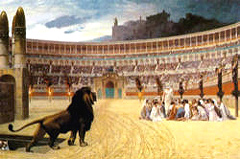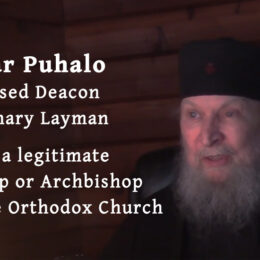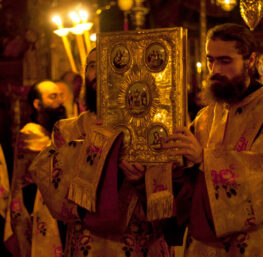 by Deacon Keith Fournier –
by Deacon Keith Fournier –
On the Memorial Feast of Justin, Martyr, we need to implore the Lord to raise up new apologists, defenders of the faith, who are unafraid to contend in the marketplace of ideas for the heart and soul of the people of our age. We live in a new missionary age. The Third Millennium of the Christian Church calls us, in the midst of a Western Culture which resembles a new Rome, to defend the faith like Justin did. May the Holy Spirit inspire men and women who, like Justin and his companions, possess the heroic courage this mission will require. …
On June 1 in the Roman Catholic Liturgical Calendar we commemorate the Memorial of a great defender of the Christian faith, Justin, Martyr. He was born of pagan parents in Samaria at the beginning of the second century. Like many young men, he spent his early years searching for the meaning of life.
Justin turned to the Greek philosophers of the age, studying Plato and Socrates. He became a student in the schools of the philosophers, seeking truth in their systems of thought. However, his hunger for truth was not satisfied and his search for truth continued, leading him to Jesus Christ and His Church.
One of the stories told of his conversion has the young Justin walking by the sea and meeting an old man who asked him what he was looking for. Justin replied “The meaning of life”. The old man was a Christian. As the story goes, he introduced Justin to the claims of the Gospel. Whether an accurate account or not, it points to the uniqueness of Justin’s contribution to the early spread of Christianity.
Even as a pagan he was impressed with the way of life of the Christians. Their fearlessness in the face of opposition from an increasingly hostile Roman empire inspired him to examine the source of their courage. He soon became one of the greatest examples of that courage when he joined their number as a member of the Church.
While some Christians in Justin’s day were hesitant about engaging the philosophers in debate or even speaking of the Christian Faith within a philosophical framework, Justin became one of the first “apologists” of the Church. He openly addressed the emperor, the Senate, and the influential teachers of the philosophical schools of the day, explaining the truths of the faith. He is the patron saint of philosophers.
He even continued to wear his philosopher’s gown after his Baptism as a sign that he viewed himself as a teacher of the only true philosophy, Christianity. His writings demonstrate how we are called to engage our own age with the truth revealed in its fullness in Jesus Christ and His Church. We need not fear the systems of thought which have captivated the modern pagans of our age or the threats of the contemporary dictatorship of relativism.
Justin opened a school in Rome where public debates were regularly held. Soon, his persuasive teaching and growing appeal to the seekers of that day began to disturb the authorities. It also raised the ire of the Cynics, one of those philosophical schools whose own claims were threatened. It may have been his debate with a Cynic philosopher which sealed his fate and helped to secure him the name “Martyr”. Justin won the debate and angered his interlocutors. He was soon denounced for being a Christian and arrested by the authorities, along with several of his companions.
The Office of Readings in the Liturgy of the Hours contains the following historic account of his Martyrdom:
**********
I have accepted the true doctrines of the Christians: From the Acts of the martyrdom of Saint Justin and his companion saints
The saints were seized and brought before the prefect of Rome, whose name was Rusticus. As they stood before the judgment seat, Rusticus the prefect said to Justin: “Above all, have faith in the gods and obey the emperors.” Justin said: “We cannot be accused or condemned for obeying the commands of our Savior, Jesus Christ.”
Rusticus said: “What system of teaching do you profess?” Justin said: “I have tried to learn about every system, but I have accepted the true doctrines of the Christians, though these are not approved by those who are held fast by error.”
The prefect Rusticus said: “Are those doctrines approved by you, wretch that you are?” Justin said: “Yes, for I follow them with their correct teaching.”
The prefect Rusticus said: “What sort of teaching is that?” Justin said: “Worship the God of the Christians. We hold him to be from the beginning the one creator and maker of the whole creation, of things seen and things unseen. We worship also the Lord Jesus Christ, the Son of God. He was foretold by the prophets as the future herald of salvation for the human race and the teacher of distinguished disciples.
“For myself, since I am a human being, I consider that what I say is insignificant in comparison with his infinite godhead. I acknowledge the existence of a prophetic power, for the one I have just spoken of as the Son of God was the subject of prophecy. I know that the prophets were inspired from above when they spoke of his coming among men.”
Rusticus said: “You are a Christian, then?” Justin said: “Yes, I am a Christian.”
The prefect said to Justin: “You are called a learned man and think that you know what is true teaching. Listen: if you were scourged and beheaded, are you convinced that you would go up to heaven?” Justin said: “I hope that I shall enter God’s house if I suffer that way. For I know that God’s favor is stored up until the end of the whole world for all who have lived good lives.”
The prefect Rusticus said: “Do you have an idea that you will go up to heaven to receive some suitable rewards?” Justin said: “It is not an idea that I have; it is something I know well and hold to be most certain.”
The prefect Rusticus said: “Now let us come to the point at issue, which is necessary and urgent. Gather round then and with one accord offer sacrifice to the gods.” Justin said: “No one who is right thinking stoops from true worship to false worship.”
The prefect Rusticus said: “If you do not do as you are commanded you will be tortured without mercy.” Justin said: “We hope to suffer torment for the sake of our Lord Jesus Christ, and so be saved. For this will bring us salvation and confidence as we stand before the more terrible and universal judgment-seat of our Lord and Savior.”
In the same way the other martyrs also said: “Do what you will. We are Christians; we do not offer sacrifice to idols.”
The prefect Rusticus pronounced sentence, saying: “Let those who have refused to sacrifice to the gods and to obey the command of the emperor be scourged and led away to suffer capital punishment according to the ruling of the laws.” Glorifying God, the holy martyrs went out to the accustomed place. They were beheaded, and so fulfilled their witness of martyrdom in confessing their faith in their Savior.”
********
We live in an age much like the one into which Justin, Martyr was sent by the Lord who called him into the mission of the Church. Like Justin, we are called to go into the center of our modern Rome and set up the “schools” from which we will engage this age with the fullness of the truth. What is needed today are new apologists, defenders of the faith, for the new evangelization.
On May 30, 2011, Pope Benedict XVI addressed the members of the Pontifical Council for Promoting New Evangelization. He reminded them:
“The Gospel is the ever new proclamation of the salvation wrought by Christ to render humanity a participant in the mystery of God and in his life of love and to open it to a future of sure and strong hope. To underscore that at this moment in the history of the Church she is called to carry out a New Evangelization, means intensifying missionary action to correspond fully with the Lord’s mandate.
“To proclaim Jesus Christ the only Savior of the world seems more complex today than in the past; but our task remains the same as at the dawn of our history. The mission has not changed, just as the enthusiasm and the courage that moved the Apostles and the first disciples must not change. The Holy Spirit who pushed them to open the doors of the Cenacle, making them into evangelizers (cf. Acts 2:1-4), is the same Spirit that moves the Church today in a renewed proclamation of hope to the men of our time.”
On this Memorial Feast of Justin, Martyr, we need to implore the Lord to raise up new apologists, defenders of the faith, who are unafraid to contend in the marketplace of ideas for the heart and soul of the people of our age. We need to be ready to become the answer to our own prayer and prepare ourselves accordingly.
We live in a new missionary age. The Third Millennium of the Christian Church calls us, in the midst of a Western Culture which resembles a new Rome, to defend the faith like Justin did. May the Holy Spirit inspire men and women who, like Justin and his companions, possess the heroic courage this mission will require. May we say “yes” to the invitation.
HT: Catholic Online.



